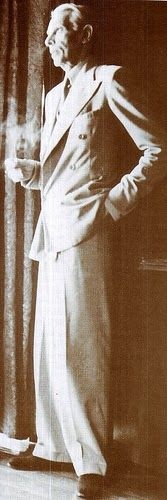Understanding Jinnah
Some two decades back, I read a book by Raj Mohan Gandhi, titled Understanding the Muslim Mind. The book is about eight great Indian Muslims, including Muhammad Ali Jinnah and Liaquat Ali Khan, who shaped the destiny of the Muslims of the subcontinent. I thought of doing a similar book that would provide insight into the Kashmir mind. But then I asked myself, could any of them really be called great men?
The eight people Raj Mohan Gandhi has written about are truly great minds and out of them I see Muhammad Ali Jinnah as the greatest, for his “indomitable will”. Also, as put by his biographer Stanly Wolpert, “his place of primacy in Pakistan’s history looms like a minaret over the achievements of all his contemporaries.”
In my search for finding what was missing in our contemporary leaders, I found that instead of redeeming people they have pushed them into a morass of uncertainty. I had an opportunity of finding a Jinnah outside his famous biographies. In two articles about him, I found a Jinnah that has hitherto remained eclipsed from people — one by his sister Fatima Jinnah titled “A businessman Becomes A Barrister” and another by Sadat Husain Manto called “Jinnah Sahib”.
His sister says his eager mind was keen to benefit from his visit to England at a time when the spirit of British liberalism was making profound impact on the minds of people. He adopted the typically English habit of reading carefully his morning newspapers. About his joining the Lincoln’s Inn, Fatima Jinnah quotes his brother as saying, “My inquiries and discussions made me decide for another inn than Lincoln’s. But then I saw the name of the great Prophet Muhammad (pbuh) engraved on the main entrance of Lincoln’s Inn among the great lawgivers of the world. So I made a sort of vow that I would join Lincoln’s Inn.”
Saadat Hasan Manto’s writings on Jinnah makes for an interesting reading in that he talks about the lifestyle of this great leader, his relations with his sisters other than Fatima Jinnah and with his servants and drivers. “The Quaid had three sisters, one of them lived at Chowpati and her husband did not earn much. Jinnah Sahib would send her some money every month.” Jinnah played billiards and would hit with precision. Manto also wrote that in politics “the Quaid never made hasty decision. As in billiards, he would examine the situation from every angle and only move when he was sure he would get it right the first time”
The search for Jinnah's vision of Pakistan
Sixty-five years after the death of its founding father, Pakistanis are still searching for Mohammed Ali Jinnah's vision for the country - and a missing historical speech.
During much of its existence, Pakistanis have been encouraged to believe that Mr Jinnah created Pakistan in the name of Islam as a theocratic state.
Others have disagreed, arguing the founding father wanted a Muslim-majority but secular and progressive country.
The debate over the two competing and contradictory visions has intensified in recent years as the country reels from growing Islamic extremism and Taliban militancy.
At the heart of this debate are some public addresses of Mr Jinnah given around the time of the partition of India in 1947.
Crucial speech
The archives of state-owned broadcaster, Radio Pakistan, also contain cranky old audio recordings of most of those speeches, except for one: his address to the Constituent Assembly in the port city of Karachi on 11 August 1947, three days before the creation of Pakistan.
For liberals in Pakistan, it was a crucial speech in which Mr Jinnah spoke in the clearest possible terms of his dream that the country he was creating would be tolerant, inclusive and secular.
"You are free. You are free to go to your temples, you are free to go to your mosques or to any other place of worship in this state of Pakistan," Jinnah declared. "You may belong to any religion or caste or creed - that has nothing to do with the business of the state."
Documented evidence suggest that Mr Jinnah's words didn't go down well with the powerful and ambitious religious ideologues around him at the time, who then made sure the speech was virtually blacked out in the next day's newspapers.
Jinnah Road in heart of Ankara
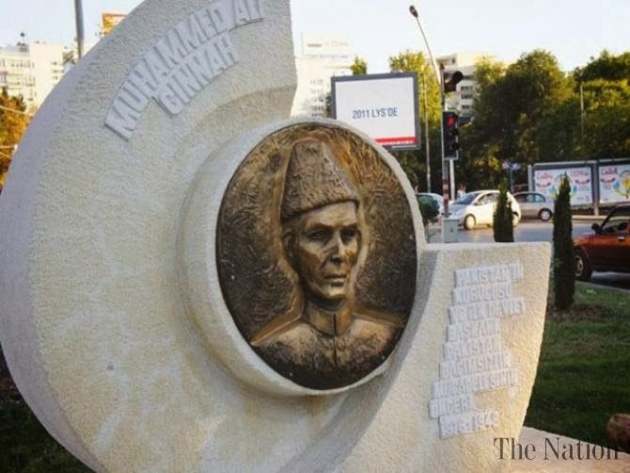
The most important and posh area of the capital has a picture of Pakistan’s founding father installed in a frame at the start of the largest road. The Cinnah Caddesi is a major road located in the heart of Ankara, the capital of Turkey. It is one of the most important arteries of traffic and commerce in the city. It was dedicated to, and named after, Quaid-e-Azam Muhammad Ali Jinnah, the founder of Pakistan. In Turkish language, Jinnah is spelled as ‘Cinnah’.
Quaid-e-Azam and The Tribals
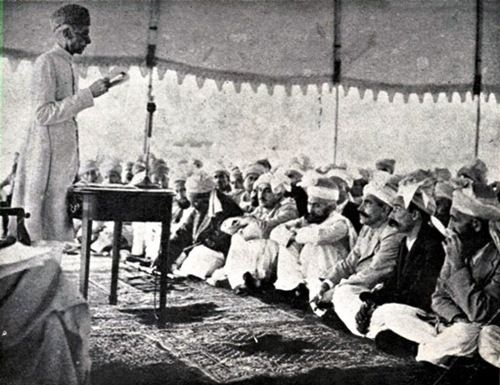
Quaid-e-Azam is addressing Tribals
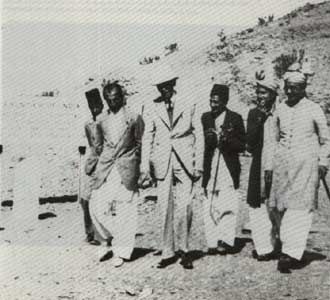
Quaid-e-Azam at the Afgan Border (1935)
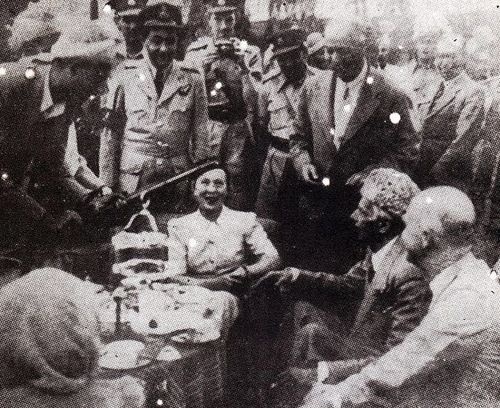
Quaid-e-Azam receiving a rifle from a tribal chief
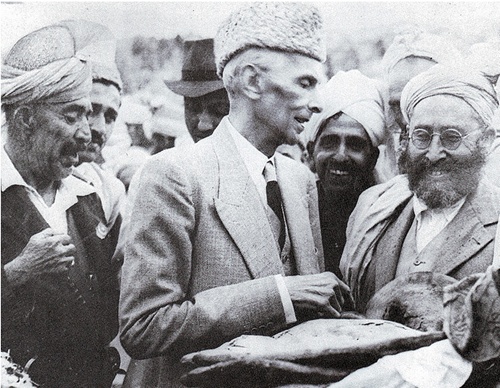
Quaid-e-Azam accepting a loaf of bread from tribesmen in Khyber Agency
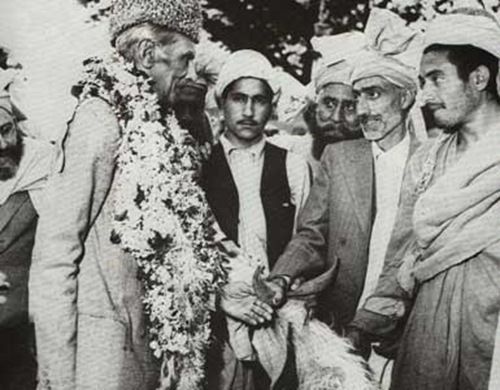
As a gesture of goodwill, tribal leaders presenting a goat to the Quaid
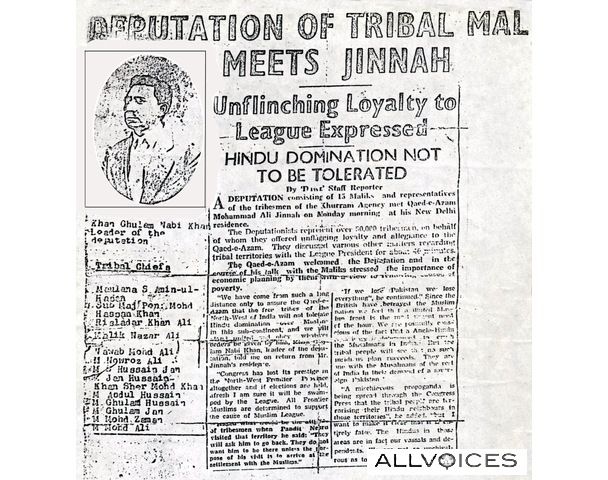
A newspaper report before the foundation of Pakistan when tribal delegation from Kurram fata meet Quaid e Azam in delihi.
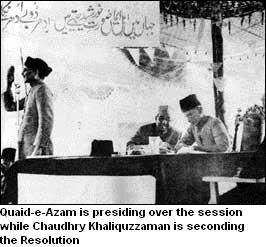
Summing up his impression about the League Session the Quaid said:
“The first thing that has emerged from this session of the All-India Muslim League is that the entire body of delegates in the open session and the vast public accepted the resolution moved by the chair, also unanimously. This has shown beyond doubt that the Musalmans are capable of standing and going through an order and trial worthy of any great organization."

